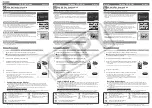
152
•
If you see what might be a good picture, give it a try. Even if the lighting isn’t
perfect, you might get interesting results!
•
Think about how you could use a picture before you take it. A full-sized picture of a
person might be perfect for a newsletter or a postcard. Since you want to show as
much of that person as possible, fill your photo with that person, not with
background. Think about calendars, cards and invitations, special occasion
memories, school learning projects, resume pictures, letterhead and business cards,
advertisements, and scrapbooks—before you point the camera.
•
Shooting pictures at eye level (especially when you’re taking photos of kids or pets)
can be more complimentary.
•
Although you can crop a photo after you’ve taken it, it’s a good idea to crop out as
much as possible when you’re composing the picture.
•
Some pictures are protected by copyright. If you download a photo from the Internet
or have a photo that was taken by a professional photographer, it is illegal for you to
make copies. For example, if someone took wedding pictures for you, you probably
only own the prints you purchased—not the right to reproduce them.
Tips About Scanning
Even though your scanner may scan images at a very high resolution, it isn’t always
necessary to do so. You’ll get the best results when you select a resolution based on how
you plan to use the photo.
Scanners use a value called dpi for dots per inch, for example 1200 dpi. When you scan at
a high resolution (a large number of dots per inch), a large file is created. If you don’t
need that high resolution, you have unnecessarily large files taking up lots of space and
slowing down the applications with which you are using them.
The following guidelines specify the typical dpi values needed for common types of
output:
•
To use photos on the Web, scan at 72 dpi.
•
To use photos on screen, for example as a slide show, scan at 72 dpi.
•
To print to a medium resolution inkjet or laser printer, scan at 150 dpi.
•
To create a 5x7 or 8x10 photo, scan at 150 dpi.
•
To print to a higher resolution laser printer, scan at 300 dpi.
The only reason why you might need to scan at resolutions above 300 dpi is if you need to
enlarge a scan to fill a larger area. If you scan at a high resolutions just because your
scanner supports them, you’ll end up with very large file sizes, without gaining in quality.
Selecting Photos
If you have several less than perfect photos to choose from, some problems are easier to
fix than others.
•
Red eye, time stamps, smaller rips, tears, and glitches are easy to fix.
















































